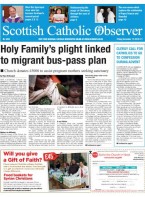October 12 | ![]() 0 COMMENTS
0 COMMENTS ![]() print
print

Year of Faith: Renewed conviction, confidence and hope in Scotland
SCO editorial leader
Many parishioners at Sunday Masses were buzzing this week as they left church after hearing Scotland’s bishops’ pastoral letter on the Year of Faith, which empowered them with resources, ideas and events to embrace. Oh yes, there was, and may still be, some cynicism. “Sure, isn’t every year a year of faith for us?” one woman asked. “And what of the Pope’s named years that have gone before, what became of those?”
While the Year of Priests 2009-2010 did its part in highlighting vocations, the name itself underscores its very specific, and worthwhile, core audience and aim. The Year of Faith, however, is an initiative that all Catholics—practising and lapse, clergy, religious and laity—can actively get behind together and continue even after the year ends.
It is no coincidence that the Year of Faith started on October 11—the 50th anniversary of opening of the Second Vatican Council. The word ‘renewal’ is all around. And, in the spirit of the Second Vatican Council’s 12th document Apostolicam Actuositatem (the Decree on the Apostolate of the Laity)—that said that lay Catholics have an ‘indispensable role in the mission of the Church’—the laity has a key role to play in the Year of Faith. Now, as in 1965 when the document was written, ‘our own times require of the laity no less zeal: in fact, modern conditions demand that their apostolate be broadened and intensified.’
Lay Catholics must once again be unabashed in leading ‘non-believers to the Faith and to instruct, strengthen, and encourage the Faithful to a more fervent life.’ As the Holy Father said at the opening of the 13th Synod of Bishops, with a focus on New Evangelisation, the need to re-Christanise European and North American society is clear.
“Marriage, in precisely the oldest regions evangelised, is going through a profound crisis,” the Pope told the bishops gathered as an example.
Paisley priest Mgr Graham Bell, under secretary of the Pontifical Council for the New Evangelisation, has spoken out on the key role of grandparents and family. “A renewed emphasis on the family, based on the Church’s teaching, is a vital part of the New Evangelisation. In this context, the role of Catholic grandparents takes on a whole new dimension,” he said.
How true of Scotland, where we will next year celebrate the 1450th anniversary of the arrival of St Columba in Iona yet where our politicians are contemplating allowing same-sex ‘marriage’ and assisted suicide, and where attempts to limit the term limit for abortion are labelled ‘sinister’ and ‘backward.’
On that subject, SNP Health Secretary Alex Neil has stepped into a developing consensus over abortion policy by stating that he believes that the 24-week limit on terminating pregnancies should be reduced. He was willing to state his opinion in spite of the controversy caused by UK Health Secretary Jeremy Hunt’s support for halving the limit to 12 weeks.
As Lord Alton of Liverpool so accurately said: “What is truly staggering is that so little is said about abhorrent laws which permit the phenomenal loss of unborn life in this country—around 600 every working day; 189,574 in the past year and on track for 7 million since legalisation of abortion in 1967—only 143 of which were undertaken where the mother’s life was at risk.”
It is little wonder that Catholics are ready to embrace the Year of Faith and the tools and opportunities it brings when the accelerating secularisation of our society is so apparent.
PIC: PAUL McSHERRY










